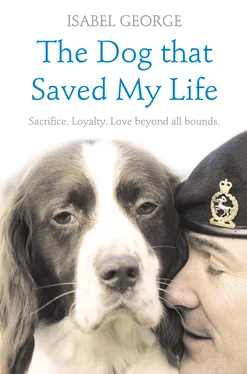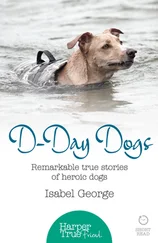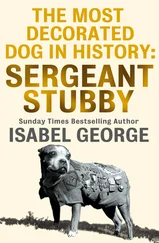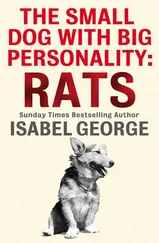‘Sergeant’ Gander was issued with his own kitbag too. It contained all he needed for a comfortable journey and protection in battle: a special dog brush, a towel, soap, water and food bowls, a towel and everything a dog might need were gathered together. Gander was assigned a seat on the train and all the men had to do was make sure their dog was neither seen nor heard by the officers. If he was discovered it was almost inevitable that the men would be ordered to leave him behind or if they were at sea he could be thrown overboard. No one was going to let their friend down.
In charge of the rather hairy recruit was Rifleman Fred Kelly. Kelly had been a dog lover all his life and from the moment Fred set his eyes on Gander it was clear to everyone that it was a perfect partnership. A soldier at the age of just 19 Fred knew more about dogs than he did about fighting but he was proud of his country and ready to do what was expected of him. The men had very little training so for Fred and his fellow Royal Rifles there was a huge fear of the unknown. For all the men, Gander became a welcome distraction from the uncertainty that plagued them day and night. At least Fred had Gander to fill his thoughts and the dog’s care to structure parts of his day. Gander needed his food and needed to be groomed, otherwise his huge fur coat would get matted and the discomfort might cause problems. An unhappy dog was not going to make for a silent travelling partner.
In some respects the partnership of Fred Kelly and Gander was something of a physical mismatch. Fred was not a tall man, but Gander was a very large dog so when they stood or sat together it was sometimes difficult to see where the great woolly dog ended and the small-framed man in uniform began. For the journey that lay ahead of them, this was to prove a useful element of camouflage. The men knew that if Gander was found they would never see him again.
Quebec, the home of the Royal Rifles of Canada, was proud of its sons in uniform. Mobilized in July 1940, the regiment drew most of its recruits from Eastern Quebec and Western New Brunswick, which made it an English-speaking unit, with a quarter of the recruits being bi-lingual French. Quebec City welcomed the men ‘home’ and arranged a parade in their honour. It was an occasion to salute the 962 men and one dog who were about to fight for their country overseas. Each man marched straight and tall behind the distinctive figures of Gander and Corporal Kelly, who led the parade. The band played and people waved their handkerchiefs and their hats to cheer the men and their faithful mascot on their way. Smoke billowed from the train awaiting the soldiers’ arrival at Valcartier station as it made ready to take the troops closer to their war. But it was only right that after the marching, Gander should take a shower. Somehow Fred managed to locate one and the hot dog was able to enjoy his last shower for a good while.
Smoke from the train swirled around as the guards and officers mingled with civilians and soldiers on the busy platform. Fred Kelly and his friends viewed the situation and tried not to look as nervous as they felt. The officers were on the look out for deserters or anyone trying to smuggle an animal mascot aboard. If only Gander had been a monkey or a kitten or something smaller than a full-grown Newfoundland dog, hiding him would have been easier. But the men were just about to discover that their dog was the most obedient creature on earth, and the cunning plan they had hatched in the relative security of Gander Airfield was about to be put to the test.
Within seconds of marching into the station the men were lining up to board the train. Fred Kelly tightened his grip on Gander’s leash as the rest of the detachment mingled to shield the dog from view. Gander wasn’t used to crowds like this and Fred could sense the big dog’s unease. All the time they were hoping no one would look down and see four hairy black paws on the ground.
Roll call sent shivers down Fred Kelly’s spine. But he need not have worried. It was to go just as they had practised. Whenever Sergeant Gander’s name was called, Fred piped up ‘Sir!’ and two of his friends started a scuffle to distract the officers while the dog was bundled onto the train. The plan worked perfectly! Now all they had to do was find their seats before any official took a backwards glance to double-check the large fur-coated recruit with the lumbering walk.
Although Sergeant Gander had a seat on the train, Fred decided to err on the side of caution and kept Gander lying on the floor for the time being. The dog was used to the floor; if he couldn’t get a bunk he would lie quietly at his master’s feet. The noise and bustle of the officers and men of the Royal Rifles of Canada and the 911 Winnipeg Grenadiers who boarded the train were enough to disguise the sound of the mascot dog’s heavy panting. But from this point on, the men had one thought – making sure their mascot stayed with them all the way. Fred Kelly’s caring approach and the tone of his voice saying, ‘That’s it, Gander old chum…quiet now…good boy…’ reassured the big dog that he was in safe hands.
The train was scheduled to stop in Ottawa, its third stop on the journey to Vancouver on the west coast. Brigadier Lawson, a veteran of the First World War, stationed in Canada’s capital and a career soldier, was to board the train as commander of ‘C’ Force – the newly created fighting force comprising the Winnipeg Grenadiers, the Royal Rifles of Canada, attached military support personnel and one mascot dog called Gander.
It was a three-day train journey and Gander was the perfect travelling companion. There was not an awful lot for a dog to do on a train and the men were afraid Gander would get bored and noisy and blow his cover but, as always, the fears can be greater than the reality. While the men played cards or disappeared into their own worlds to write letters to loved ones, Gander stayed with them. Sometimes he chose a lap to lie on or, if someone left their seat for too long, he would stretch out and fall asleep for a while or at least until the rightful owner gave Gander a gentle nudge to leave. No one minded Gander plonking his big slobbering jaws on their lap. If he decided you were going to be the play partner for the day it was best to give into it because he would never let a soldier have any peace until they had played at least one game of tug of war with a sock. The most difficult part about having Gander along for the ride was the impossibility of taking him for walks. Gander was very patient but he was a big dog and it wasn’t good to keep him cooped up in the train, but the men had no choice. They had come this far, so they made sure that Gander had long play sessions with improvised toys and a huge amount of tickles and play fights. Unable to enjoy his favourite thing of all, a shower, Fred ensured that he was washed down and that he had long grooming sessions too. Toileting was difficult for Gander because at almost three years old he was used to looking after himself. This was like puppy training all over again. The good thing was, Fred Kelly was used to dogs and had the inbuilt patience to coach Gander through the necessary paces. He also had to have everyone else’s support to make it work and in case of ‘accidents’. Fred created a toilet area for Gander in one of the washrooms. After a few days it was clear what he needed to perform and when, so Fred accompanied the dog and dealt with it all. It was rare that anyone else had anything to do as Gander was very ‘regular’ and Fred was never far away. If there was the odd accident the men knew what to do.
But another challenge lay ahead. Arriving in Vancouver on 28 October the men found the troopships, the HMNZS Awatea and HMCS Prince Robert , docked and waiting for them to embark. Before the war the massive and majestic Awatea , a converted luxury liner, had run between her home in New Zealand and Canada. Now her state rooms accommodated the officers while the men, the majority of them Winnipeg Grenadiers, slung their hammocks in every available space, even above the mess tables. The remainder of ‘C’ Force, the Royal Rifles of Canada, boarded the HMCS Prince Robert , the escort vessel, and Gander was amongst them.
Читать дальше












